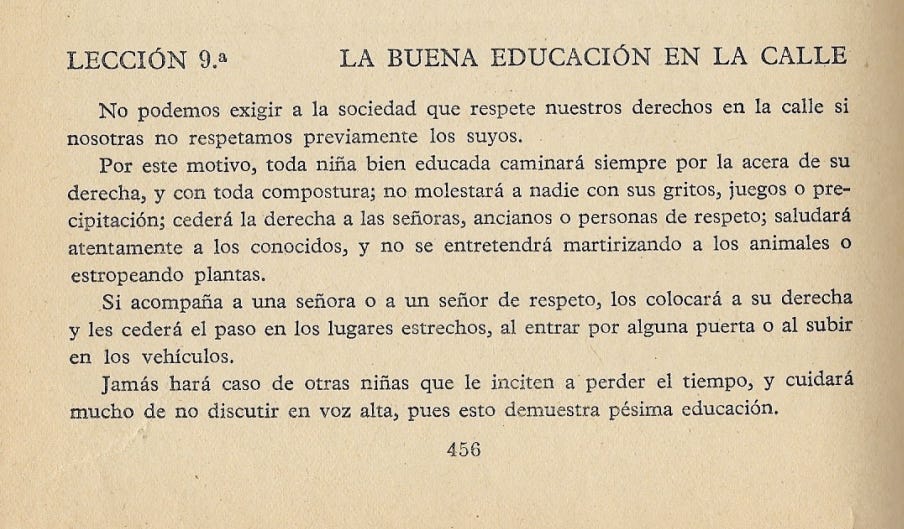Boletín 104 - Colpbol, ChatGTP y el sistema educativo franquista.
From a 1960s era Spanish text book for 7-8 year-old children: “With the cry “Arise Spain!” we express the peak of greatness. “Arise” best expresses our desire in wanting Spain to everyday be better, more vigorous, more perfect and more glorious.”.
Hello subscribers!
I hope you enjoyed the Volver Q&A last week with Dr Ana. Feedback has been very positive and I hope your students enjoyed reading it.
The glue holding this latest issue together is the topic of education. I always try to incorporate history, culture and news into the Boletín and this week’s articles hopefully satisfy that criteria.
Text one is about a sport invented in Spain in 1997 called Colpbol.
Text two is about the questions artificial intelligence/ChatGPT poses for education.
Text three is about the education systems under the Republic and Franco.
There are just under 14 weeks left until the GCSE/GCE speaking exams so the exam style question this week is a Set B discussion card.
The quote at the top of the page is taken directly from a book well-known to those educated in 1960’s Spain. The Alvarez Encyclopedia. A relic of the past. Many well-thumbed copies can be found here. I rhink they’d make an excellent authentic resource to exploit in an A-Level Spanish class alongside La Guía de la Buena Esposa which I’m still dubious about. Was it actually published? I’ve read conflicting accounts. Nonetheless, every year it provokes such good opinions from my year 12s. If you haven’t used it then have a look. It’s a great way to introduce the imperative.
Anyway, back to the Alvarez Encyclopedia. Girls and boys were educated differently when this encyclopedia was published in 1961.
Let’s look at one section tailored to young Spanish girls (I’ve included some snippets in italics):
Formación familiar y social (niñas).
Lesson 1: Behaviour in school. No seamos, pues, «gruñosas».
Lesson 2: The necessity to be organised. ¡Qué buen efecto produce una casa dirigida por una mujer que desde niña aprendió a ser ordenada!
Lesson 3: Hygeine, cleanliness and attracivness. Agua y aire puro. He aquí las dos cosas suficientes e imprescindibles para que una niña sea limpia, sana y atractiva.
Lesson 4: Kindness and likeability/charm. Para ser amables es preciso que luchemos constantamento contra nuestros impulsos egoístas.
Lesson 5: Friendship and keeping good company. La amistad consiste en el aprecio y lealtad que sentimos hacia ciertas personas.
Lesson 6: Sporting spirit. Cuando nos toque perder, aceptemos la derrota con nobleza (as a chess player this one I like and I have had to do many times).
Lesson 7: Courtesy at home. La cortesía consiste en la demostración del respeto.
Lesson 8: Duties and sibling relationships. Estad siempre dispuestas a ceder en pro de la paz fraternal.
Lesson 9: Good street manners. Toda niña bien cuidará de no discutir en voz alta, pues esto demuestra pésima educación.
Lesson 10: Courtesy and respect in the place of worship. No olvidemos nunca que Dios está observando nuestro comportamiento.
And now over to the boys.
Formación político-social (niños).
Lesson 1: The national flag. El color rojo representa la sangre que por defender la Patria han vertido miles y miles de buenos españoles a través de la Historia.
Lesson 2: The Falangist flag. Sus franjas en sentido vertical significan que nuestra posición ha de ser erguida y vigilante.
Lesson 3: The traditionalist flag. La bandera Tradicionalista es simbolo de la tradición católica y sana de España.
Lesson 4: The national coat of arms. El yugo y las flechas son el emblema de los Reyes Católicos, y simbolizan la unidad, la fuerza y el afán de grandeza.
Lesson 5: The yoke and arrows. Dicho emblema tiene su origen en el reinado de los Reyes Católicos.
Lesson 6: National anthems and songs. Las ideas sobresalientes de este canto (Cara al sol) son cuatro: juventud, guerra, muerte y victoria).
Lesson 7: Missing. There isn’t actually a 7th lesson. Text book mistakes go back some time it seems.
Lesson 8: Spain together, great and free. Nada de rivalidades regionales, ni de luchas de clases. Todos a una, colaboremos por la unidad, grandeza y libertad de la Patria.
Lesson 9: Arise Spain! Arriba expresa mejor nuestro deseo de querer una España cada día mejor, más vigorosa, más perfecta y más gloriosa.
We’ll skip a few at this point 🥱
Lesson 16: The leader. Desde las Canarias Franco planeó el Glorioso Alzamiento Nacional.
Structures/vocabulary to look out for this week.
Darse cuenta - To realise
Tener en cuenta - To keep in mind
Passive se structures
Grammar to find.
Adjectives (plenty of these this week)
The present perfect tense
Al + infinitive + direct object pronoun
The imperfect tense
Apocopated adjectives (learn more about those here)
Para where in order to can be used.
After last weeks post this latest edition was always going to pale in comparison so I will leave it there for this week.
Thanks as ever for reading!
Download edition 104 here.
A reminder that Boletín extras are available. The most useful of which is an updated index of topics from 1-100 including an index of exam style questions for targetted interventions based on mocks. Thanks to those who have already downloaded it!
Thanks,
Ollie.





